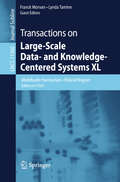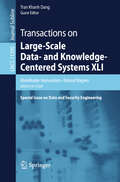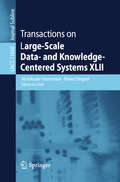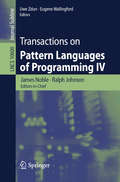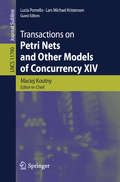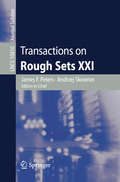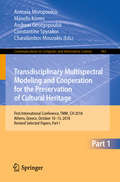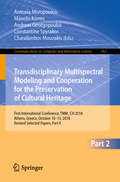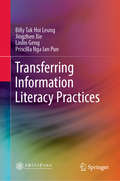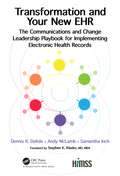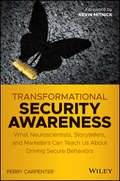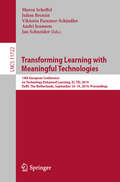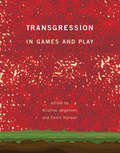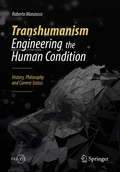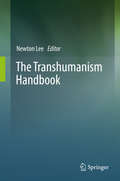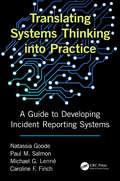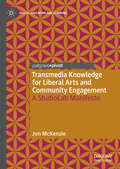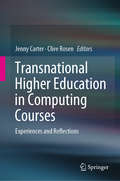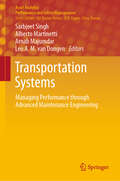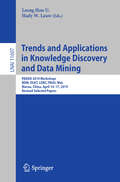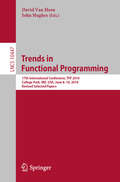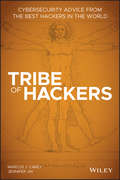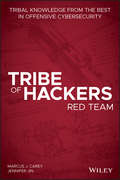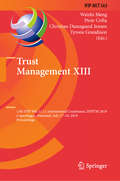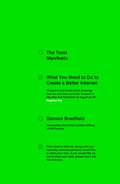- Table View
- List View
Transactions on Large-Scale Data- and Knowledge-Centered Systems XL (Lecture Notes in Computer Science #11360)
by Abdelkader Hameurlain Roland Wagner Franck Morvan Lynda TamineThis, the 40th issue of Transactions on Large-Scale Data- and Knowledge-Centered Systems, contains five revised selected regular papers. Topics covered include personalized social query expansion approaches, continuous query on social media streams, elastic processing systems, and semantic interoperability for smart grids and NoSQL environments.
Transactions on Large-Scale Data- and Knowledge-Centered Systems XLI: Special Issue on Data and Security Engineering (Lecture Notes in Computer Science #11390)
by Abdelkader Hameurlain Roland Wagner Tran Khanh DangThe LNCS journal Transactions on Large-Scale Data- and Knowledge-Centered Systems focuses on data management, knowledge discovery, and knowledge processing, which are core and hot topics in computer science. Since the 1990s, the Internet has become the main driving force behind application development in all domains. An increase in the demand for resource sharing across different sites connected through networks has led to an evolution of data- and knowledge-management systems from centralized systems to decentralized systems enabling large-scale distributed applications providing high scalability. Current decentralized systems still focus on data and knowledge as their main resource. Feasibility of these systems relies basically on P2P (peer-to-peer) techniques and the support of agent systems with scaling and decentralized control. Synergy between grids, P2P systems, and agent technologies is the key to data- and knowledge-centered systems in large-scale environments.This, the 41st issue of Transactions on Large-Scale Data- and Knowledge-Centered Systems, contains seven revised, extended papers selected from the 4th International Conference on Future Data and Security Engineering, FDSE 2017, which was held in Ho Chi Minh City, Vietnam, in November/December 2017. The main focus of this special issue is on data and security engineering, as well as engineering applications.
Transactions on Large-Scale Data- and Knowledge-Centered Systems XLII (Lecture Notes in Computer Science #11860)
by Abdelkader Hameurlain Roland WagnerThe LNCS journal Transactions on Large-Scale Data- and Knowledge-Centered Systems focuses on data management, knowledge discovery, and knowledge processing, which are core and hot topics in computer science. Since the 1990s, the Internet has become the main driving force behind application development in all domains. An increase in the demand for resource sharing across different sites connected through networks has led to an evolution of data- and knowledge-management systems from centralized systems to decentralized systems enabling large-scale distributed applications providing high scalability. Current decentralized systems still focus on data and knowledge as their main resource. Feasibility of these systems relies basically on P2P (peer-to-peer) techniques and the support of agent systems with scaling and decentralized control. Synergy between grids, P2P systems, and agent technologies is the key to data- and knowledge-centered systems in large-scale environments. This, the 42nd issue of Transactions on Large-Scale Data- and Knowledge-Centered Systems, consists of five revised selected regular papers, presenting the following topics: Privacy-Preserving Top-k Query Processing in Distributed Systems; Trust Factors and Insider Threats in Permissioned Distributed Ledgers: An Analytical Study and Evaluation of Popular DLT Frameworks; Polystore and Tensor Data Model for Logical Data Independence and Impedance Mismatch in Big Data Analytics; A General Framework for Multiple Choice Question Answering Based on Mutual Information and Reinforced Co-occurrence; Rejig: A Scalable Online Algorithm for Cache Server Configuration Changes.
Transactions on Pattern Languages of Programming IV (Lecture Notes in Computer Science #10600)
by Ralph Johnson Uwe Zdun James Noble Eugene WallingfordThe Transactions on Pattern Languages of Programming subline aims to publish papers on patterns and pattern languages as applied to software design, development, and use, throughout all phases of the software life cycle, from requirements and design to implementation, maintenance and evolution. The primary focus of this LNCS Transactions subline is on patterns, pattern collections, and pattern languages themselves. The journal also includes reviews, survey articles, criticisms of patterns and pattern languages, as well as other research on patterns and pattern languages. This book, the third volume in the Transactions on Pattern Languages of Programming series, presents five papers that have been through a careful peer review process involving both pattern experts and domain experts. The papers present various pattern languages and a study of applying patterns and represent some of the best work that has been carried out in design patterns and pattern languages of programming over the last few years.
Transactions on Petri Nets and Other Models of Concurrency XIV (Lecture Notes in Computer Science #11790)
by Maciej Koutny Lucia Pomello Lars Michael KristensenThe 14th volume of ToPNoC contains revised and extended versions of a selection of the best workshop and tutorial papers presented at the 39th International Conference on Application and Theory of Petri Nets and Concurrency, Petri Nets 2018, and the 18th International Conference on Application of Concurrency to System Design, ACSD 2018.The 10 papers cover a diverse range of topics including model checking and system verification, refinement, and synthesis; foundational work on specific classes of Petri nets; and innovative applications of Petri nets and other models of concurrency. Application areas covered in this volume are: process mining, verification, formal semantics, communication protocols, business processes, distributed systems, and net synthesis. Thus, this volume gives a good overview of ongoing research on concurrent systems and Petri nets.
Transactions on Rough Sets XXI (Lecture Notes in Computer Science #10810)
by James F. Peters Andrzej SkowronThe LNCS journal Transactions on Rough Sets is devoted to the entire spectrum of rough sets related issues, from logical and mathematical foundations, through all aspects of rough set theory and its applications, such as data mining, knowledge discovery, and intelligent information processing, to relations between rough sets and other approaches to uncertainty, vagueness, and incompleteness, such as fuzzy sets and theory of evidence. Volume XXI in the series is a continuation of a number of research streams that have grown out of the seminal work of Zdzislaw Pawlak during the first decade of the 21st century.
Transdisciplinary Multispectral Modeling and Cooperation for the Preservation of Cultural Heritage: First International Conference, TMM_CH 2018, Athens, Greece, October 10–13, 2018, Revised Selected Papers, Part I (Communications in Computer and Information Science #961)
by Antonia Moropoulou Manolis Korres Andreas Georgopoulos Constantine Spyrakos Charalambos MouzakisThis two-volume set CCIS 961 and 962 constitutes the refereed post-conference proceedings of the First International Conference on Transdisciplinary Multispectral Modeling and Cooperation for the Preservation of Cultural Heritage, TMM_CH 2018, held in Athens, Greece, in October 2018.73 revised full papers of 237 submissions are included in these volumes. The papers of the first volume are organized in the following topical sections: the project of the rehabilitation of Holy Sepulchre’s Holy Aedicule as a pilot multispectral, multidimensional, novel approach through transdisciplinary and cooperation in the protection of monuments; digital heritage; novel educational approach for the preservation of monuments; resilience to climate change and natural hazards; conserving sustainably the materiality of structures and architectural authenticity; and interdisciplinary preservation and management of cultural heritage. And the papers of the second volume are organized in the following topical sections: sustainable preservation and management lessons learnt on emblematic monuments; cross-discipline earthquake protection and structural assessment of monuments; cultural heritage and pilgrimage tourism; reuse, circular economy and social participation as a leverage for the sustainable preservation and management of historic cities; inception – inclusive cultural heritage in Europe through 3D semantic modelling; heritage at risk; and advanced and non-destructive techniques for diagnosis, design and monitoring.
Transdisciplinary Multispectral Modeling and Cooperation for the Preservation of Cultural Heritage: First International Conference, TMM_CH 2018, Athens, Greece, October 10–13, 2018, Revised Selected Papers, Part II (Communications in Computer and Information Science #962)
by Charalambos Mouzakis Constantine Spyrakos Andreas Georgopoulos Manolis Korres Antonia MoropoulouThis two-volume set CCIS 961 and 962 constitutes the refereed post-conference proceedings of the First International Conference on Transdisciplinary Multispectral Modeling and Cooperation for the Preservation of Cultural Heritage, TMM_CH 2018, held in Athens, Greece, in October 2018. 73 revised full papers of 237 submissions are included in these volumes. The papers of the first volume are organized in the following topical sections: the project of the rehabilitation of Holy Sepulchre’s Holy Aedicule as a pilot multispectral, multidimensional, novel approach through transdisciplinary and cooperation in the protection of monuments; digital heritage; novel educational approach for the preservation of monuments; resilience to climate change and natural hazards; conserving sustainably the materiality of structures and architectural authenticity; and interdisciplinary preservation and management of cultural heritage. And the papers of the second volume are organized in the following topical sections: sustainable preservation and management lessons learnt on emblematic monuments; cross-discipline earthquake protection and structural assessment of monuments; cultural heritage and pilgrimage tourism; reuse, circular economy and social participation as a leverage for the sustainable preservation and management of historic cities; inception – inclusive cultural heritage in Europe through 3D semantic modelling; heritage at risk; and advanced and non-destructive techniques for diagnosis, design and monitoring.
Transferring Information Literacy Practices
by Billy Tak Leung Jingzhen Xie Linlin Geng Priscilla Nga PunThis book focuses on information literacy for the younger generation of learners and library readers. It is divided into four sections: 1. Information Literacy for Life; 2. Searching Strategies, Disciplines and Special Topics; 3. Information Literacy Tools for Evaluating and Utilizing Resources; 4. Assessment of Learning Outcomes. Written by librarians with wide experience in research and services, and a strong academic background in disciplines such as the humanities, social sciences, information technology, and library science, this valuable reference resource combines both theory and practice. In today's ever-changing era of information, it offers students of library and information studies insights into information literacy as well as learning tips they can use for life.
Transformation and Your New EHR: The Communications and Change Leadership Playbook for Implementing Electronic Health Records (HIMSS Book Series)
by Dennis Delisle Andy McLamb Samantha InchTransformation and Your New EHR offers a robust communication and change leadership approach to support electronic health record (EHR) implementations and transformation journeys. This book highlights the approach and philosophy of communication, change leadership, and systems and process design, giving readers a practical view into the successes and failures that can be experienced throughout the evolution of an EHR implementation.
Transformational Security Awareness: What Neuroscientists, Storytellers, and Marketers Can Teach Us About Driving Secure Behaviors
by Perry CarpenterExpert guidance on the art and science of driving secure behaviors Transformational Security Awareness empowers security leaders with the information and resources they need to assemble and deliver effective world-class security awareness programs that drive secure behaviors and culture change. When all other processes, controls, and technologies fail, humans are your last line of defense. But, how can you prepare them? Frustrated with ineffective training paradigms, most security leaders know that there must be a better way. A way that engages users, shapes behaviors, and fosters an organizational culture that encourages and reinforces security-related values. The good news is that there is hope. That’s what Transformational Security Awareness is all about. Author Perry Carpenter weaves together insights and best practices from experts in communication, persuasion, psychology, behavioral economics, organizational culture management, employee engagement, and storytelling to create a multidisciplinary masterpiece that transcends traditional security education and sets you on the path to make a lasting impact in your organization. Find out what you need to know about marketing, communication, behavior science, and culture management Overcome the knowledge-intention-behavior gap Optimize your program to work with the realities of human nature Use simulations, games, surveys, and leverage new trends like escape rooms to teach security awareness Put effective training together into a well-crafted campaign with ambassadors Understand the keys to sustained success and ongoing culture change Measure your success and establish continuous improvements Do you care more about what your employees know or what they do? It's time to transform the way we think about security awareness. If your organization is stuck in a security awareness rut, using the same ineffective strategies, materials, and information that might check a compliance box but still leaves your organization wide open to phishing, social engineering, and security-related employee mistakes and oversights, then you NEED this book.
Transforming Learning with Meaningful Technologies: 14th European Conference on Technology Enhanced Learning, EC-TEL 2019, Delft, The Netherlands, September 16–19, 2019, Proceedings (Lecture Notes in Computer Science #11722)
by Maren Scheffel Julien Broisin Viktoria Pammer-Schindler Andri Ioannou Jan SchneiderThis book constitutes the proceedings of the 14th European Conference on Technology Enhanced Learning, EC-TEL 2019, held in Delft, The Netherlands, in September 2019. The 41 research papers and 50 demo and poster papers presented in this volume were carefully reviewed and selected from 149 submissions. The contributions reflect the debate around the role of and challenges for cutting-edge 21st century meaningful technologies and advances such as artificial intelligence and robots, augmented reality and ubiquitous computing technologies and at the same time connecting them to different pedagogical approaches, types of learning settings, and application domains that can benefit from such technologies.
Transgression in Games and Play (The\mit Press Ser.)
by Kristine Jørgensen Faltin KarlsenContributors from a range of disciplines explore boundary-crossing in videogames, examining both transgressive game content and transgressive player actions.Video gameplay can include transgressive play practices in which players act in ways meant to annoy, punish, or harass other players. Videogames themselves can include transgressive or upsetting content, including excessive violence. Such boundary-crossing in videogames belies the general idea that play and games are fun and non-serious, with little consequence outside the world of the game. In this book, contributors from a range of disciplines explore transgression in video games, examining both game content and player actions. The contributors consider the concept of transgression in games and play, drawing on discourses in sociology, philosophy, media studies, and game studies; offer case studies of transgressive play, considering, among other things, how gameplay practices can be at once playful and violations of social etiquette; investigate players' emotional responses to game content and play practices; examine the aesthetics of transgression, focusing on the ways that game design can be used for transgressive purposes; and discuss transgressive gameplay in a societal context. By emphasizing actual player experience, the book offers a contextual understanding of content and practices usually framed as simply problematic.ContributorsFraser Allison, Kristian A. Bjørkelo, Kelly Boudreau, Marcus Carter, Mia Consalvo, Rhys Jones, Kristine Jørgensen, Faltin Karlsen, Tomasz Z. Majkowski, Alan Meades, Torill Elvira Mortensen, Víctor Navarro-Remesal, Holger Pötzsch, John R. Sageng, Tanja Sihvonen, Jaakko Stenros, Ragnhild Tronstad, Hanna Wirman
Transhumanism - Engineering the Human Condition: History, Philosophy and Current Status (Springer Praxis Books)
by Roberto ManzoccoThis book is designed to offer a comprehensive high-level introduction to transhumanism, an international political and cultural movement that aims to produce a “paradigm shift” in our ethical and political understanding of human evolution. Transhumanist thinkers want the human species to take the course of evolution into its own hands, using advanced technologies currently under development – such as robotics, artificial intelligence, biotechnology, cognitive neurosciences, and nanotechnology – to overcome our present physical and mental limitations, improve our intelligence beyond the current maximum achievable level, acquire skills that are currently the preserve of other species, abolish involuntary aging and death, and ultimately achieve a post-human level of existence. The book covers transhumanism from a historical, philosophical, and scientific viewpoint, tracing its cultural roots, discussing the main philosophical, epistemological, and ethical issues, and reviewing the state of the art in scientific research on the topics of most interest to transhumanists. The writing style is clear and accessible for the general reader, but the book will also appeal to graduate and undergraduate students.
The Transhumanism Handbook
by Newton LeeModern humanity with some 5,000 years of recorded history has been experiencing growing pains, with no end in sight. It is high time for humanity to grow up and to transcend itself by embracing transhumanism. Transhumanism offers the most inclusive ideology for all ethnicities and races, the religious and the atheists, conservatives and liberals, the young and the old regardless of socioeconomic status, gender identity, or any other individual qualities. This book expounds on contemporary views and practical advice from more than 70 transhumanists. Astronaut Neil Armstrong said on the Apollo 11 moon landing in 1969, “One small step for a man, one giant leap for mankind.” Transhumanism is the next logical step in the evolution of humankind, and it is the existential solution to the long-term survival of the human race.
Translating Systems Thinking into Practice: A Guide to Developing Incident Reporting Systems
by Natassia Goode Paul M. Salmon Michael Lenne Caroline FinchSystems thinking tells us that human error, violations and technology failures result from poorly designed and managed work systems. To help us understand and prevent injuries and incidents, incident reporting systems must be capable of collecting data on contributory factors from across the overall work system, in addition to factors relating to the immediate context of the event (e.g. front-line workers, environment, and equipment). This book describes how to design a practical, usable incident reporting system based on this approach. The book contains all the information needed to effectively design and implement a new incident reporting system underpinned by systems thinking. It also provides guidance on how to evaluate and improve existing incident reporting systems so they are practical for users, collect good quality data, and reflect the principles of systems thinking. Features Highlights the key principles of systems thinking for designing incident reporting systems Outlines a process for developing and testing incident reporting systems Describes how to evaluate incident reporting systems to ensure they are practical, usable, and collect good quality data Provides detailed guidance on how to analyze incident data, and translate the findings into appropriate incident prevention strategies
Transmedia Knowledge for Liberal Arts and Community Engagement: A StudioLab Manifesto (Digital Education and Learning)
by Jon McKenzieThis book sets forth a pedagogy for renewing the liberal arts by combining critical thinking, media activism, and design thinking. Using the StudioLab approach, the author seeks to democratize the social and technical practices of digital culture just as nineteenth century education sought to democratize literacy. This production of transmedia knowledge—from texts and videos to comics and installations—moves students between seminar, studio, lab, and field activities. The book also wrestles with the figure of Plato and the very medium of knowledge to re-envision higher education in contemporary societies, issuing a call for community engagement as a form of collective thought-action.
Transnational Higher Education in Computing Courses: Experiences and Reflections
by Jenny Carter Clive RosenThere has been exponential growth in transnational education (TNE) in the last few years as UK universities have looked to expand their markets. Recipient countries have sought short cuts to developing their higher education provision which has proved a lucrative income stream for some universities. But overseas collaborations are not without risk. Recipient countries can be concerned with external influence over curricula, quality being diluted and higher education being infected by neo-imperialism. These concerns are not without foundation. There are risks for providers too. Reputations can be damaged if academic standards are compromised. Conflicts of interest can occur between quality of provision and the pot of gold on offer. Staff can view overseas collaborations as distracting from their research and commitment to home students. Computing is a particularly popular subject for TNE, but critical thinking, analysis, independent learning, and creativity can be compromised. Preventing plagiarism is difficult. Constant changes in technology result in constant curricula revision which causes severe problems for overseas collaborations. This book focuses on TNE in the computing domain. However cross-cultural issues challenge TNE management and administration whatever the subject area. If the ever present tensions are not continuously monitored they can quickly threaten the sustainability of the collaboration. This book identifies many of the threats and some of the solutions. The readership for this book is truly global. Any international development officer in higher education considering an overseas collaboration will benefit from this book. Any academic becoming engaged in, or already involved with a TNE partnership, either as provider or recipient, will gain information and insight into the practice and issues. Researchers in TNE will discover more lines of enquiry. Students considering a course with an overseas provider or in coming to the UK to study will be better prepared thereby enabling a more fulfilling and rewarding experience. Anyone who has an interest in TNE, whether at the senior executive level, operational level, delivering programmes or as a recipient of TNE should read this book. The wealth of experience gathered here will provoke questions, prompt debate and offer solutions. It has been written by people who know the issues, bear the scars and are happy to share their knowledge. It will greatly benefit future transnational collaborations.
Transportation Systems: Managing Performance through Advanced Maintenance Engineering (Asset Analytics)
by Sarbjeet Singh Alberto Martinetti Arnab Majumdar Leo A. M. van DongenThis book explores the application of breakthrough technologies to improve transportation performance. Transportation systems represent the “blood vessels” of a society, in which people and goods travel. They also influence people’s lives and affect the liveability and sustainability of our cities. The book shows how emergent technologies are able to monitor the condition of the structure in real time in order to schedule the right moment for maintenance activities an so reduce the disturbance to users.This book is a valuable resource for those involved in research and development in this field. Part I discusses the context of transportation systems, highlighting the major issues and challenges, the importance of understating human factors that could affect the maintenance operations and the main goals in terms of safety standards. Part II focuses on process-oriented innovations in transportation systems; this section stresses the importance of including design parameters in the planning, offering a comparison between risk-based and condition-based maintenance and, lastly, showing applications of emergent technologies. Part III goes on to reflect on the technical-oriented innovations, discussing the importance of studying the physical phenomena that are behind transportation system failures and problems. It then introduces the general trend of collecting and analyzing big data using real-world cases to evaluate the positive and negative aspects of adopting extensive smart sensors for gathering information on the health of the assets. The last part (IV) explores cultural and behavioural changes, and new knowledge management methods, proposing novel forms of maintenance and vocational training, and introduces the need for radical new visions in transportation for managing unexpected events.The continuous evolution of maintenance fields suggests that this compendium of “state-of-the-art” applications will not be the only one; the authors are planning a collection of cutting-edge examples of transportation systems that can assist researchers and practitioners as well as students in the process of understanding the complex and multidisciplinary environment of maintenance engineering applied to the transport sector.
Trends and Applications in Knowledge Discovery and Data Mining: PAKDD 2019 Workshops, BDM, DLKT, LDRC, PAISI, WeL, Macau, China, April 14–17, 2019, Revised Selected Papers (Lecture Notes in Computer Science #11607)
by Leong Hou U. Hady W. LauwThis book constitutes the thoroughly refereed post-workshop proceedings of the workshops that were held in conjunction with the 23rd Pacific-Asia Conference on Knowledge Discovery and Data Mining, PAKDD 2019, in Macau, China, in April 2019.The 31 revised papers presented were carefully reviewed and selected from a total of 52 submissions. They stem from the following workshops: · PAISI 2019: 14th Pacific Asia Workshop on Intelligence and Security Informatics · WeL 2019: PAKDD 2019 Workshop on Weakly Supervised Learning: Progress and Future · LDRC 2019: PAKDD 2019 Workshop on Learning Data Representation for Clustering· BDM 2019: 8th Workshop on Biologically-inspired Techniques for Knowledge Discovery and Data Mining · DLKT 2019: 1st Pacific Asia Workshop on Deep Learning for Knowledge Transfer
Trends in Functional Programming: 17th International Conference, TFP 2016, College Park, MD, USA, June 8-10, 2016, Revised Selected Papers (Lecture Notes in Computer Science #10447)
by David Van Horn John HughesThis book constitutes the refereed proceedings of the 17th International Conference on Trends in Functional Programming, TFP 2016, held in College Park, USA, in June 2016.The 10 full papers presented in this volume were carefully reviewed and selected from 18 submissions. The papers were organized in topical sections named: implementation techniques; types and verification; and programming.
Tribe of Hackers: Cybersecurity Advice from the Best Hackers in the World (Tribe of Hackers)
by Marcus J. Carey Jennifer JinTribe of Hackers: Cybersecurity Advice from the Best Hackers in the World (9781119643371) was previously published as Tribe of Hackers: Cybersecurity Advice from the Best Hackers in the World (9781793464187). While this version features a new cover design and introduction, the remaining content is the same as the prior release and should not be considered a new or updated product. Looking for real-world advice from leading cybersecurity experts? You’ve found your tribe. Tribe of Hackers: Cybersecurity Advice from the Best Hackers in the World is your guide to joining the ranks of hundreds of thousands of cybersecurity professionals around the world. Whether you’re just joining the industry, climbing the corporate ladder, or considering consulting, Tribe of Hackers offers the practical know-how, industry perspectives, and technical insight you need to succeed in the rapidly growing information security market. This unique guide includes inspiring interviews from 70 security experts, including Lesley Carhart, Ming Chow, Bruce Potter, Robert M. Lee, and Jayson E. Street. Get the scoop on the biggest cybersecurity myths and misconceptions about security Learn what qualities and credentials you need to advance in the cybersecurity field Uncover which life hacks are worth your while Understand how social media and the Internet of Things has changed cybersecurity Discover what it takes to make the move from the corporate world to your own cybersecurity venture Find your favorite hackers online and continue the conversation Tribe of Hackers is a must-have resource for security professionals who are looking to advance their careers, gain a fresh perspective, and get serious about cybersecurity with thought-provoking insights from the world’s most noteworthy hackers and influential security specialists.
Tribe of Hackers Red Team: Tribal Knowledge from the Best in Offensive Cybersecurity
by Marcus J. Carey Jennifer JinWant Red Team offensive advice from the biggest cybersecurity names in the industry? Join our tribe.The Tribe of Hackers team is back with a new guide packed with insights from dozens of the world’s leading Red Team security specialists. With their deep knowledge of system vulnerabilities and innovative solutions for correcting security flaws, Red Team hackers are in high demand. Tribe of Hackers Red Team: Tribal Knowledge from the Best in Offensive Cybersecurity takes the valuable lessons and popular interview format from the original Tribe of Hackers and dives deeper into the world of Red Team security with expert perspectives on issues like penetration testing and ethical hacking. This unique guide includes inspiring interviews from influential security specialists, including David Kennedy, Rob Fuller, Jayson E. Street, and Georgia Weidman, who share their real-world learnings on everything from Red Team tools and tactics to careers and communication, presentation strategies, legal concerns, and more Learn what it takes to secure a Red Team job and to stand out from other candidates Discover how to hone your hacking skills while staying on the right side of the law Get tips for collaborating on documentation and reporting Explore ways to garner support from leadership on your security proposals Identify the most important control to prevent compromising your network Uncover the latest tools for Red Team offensive security Whether you’re new to Red Team security, an experienced practitioner, or ready to lead your own team, Tribe of Hackers Red Team has the real-world advice and practical guidance you need to advance your information security career and ready yourself for the Red Team offensive.
Trust Management XIII: 13th IFIP WG 11.11 International Conference, IFIPTM 2019, Copenhagen, Denmark, July 17-19, 2019, Proceedings (IFIP Advances in Information and Communication Technology #563)
by Weizhi Meng Piotr Cofta Christian Damsgaard Jensen Tyrone GrandisonThis book constitutes the refereed proceedings of the 13th IFIP WG 11.11 International Conference on Trust Management, IFIPTM 2019, held in Copenhagen, Denmark, in July 2019.The 7 revised full papers, 3 short papers, and 6 work-in-progress papers presented were carefully reviewed and selected from 32 submissions. The papers cover a broad range of topics related to trust, security and privacy and focus on trust in information technology and identity management, socio-technical and sociological trust, and emerging technology for trust.
The Trust Manifesto: What you Need to do to Create a Better Internet
by Damian BradfieldFrom the moment we wake up and unlock our phones, we're producing data. We offer up our unique fingerprint to the online world, scan our route to work, listen to a guided meditation or favourite playlist, slide money around, share documents and update our social media accounts. We reach for our phones up to 200 times a day, not knowing which companies are storing, using, selling and manipulating our data. But do we care? We're busy. We've got lives. We're pressed for time! There aren't enough hours in the day to read the terms and conditions. Or, maybe we're happy to trade our personal data for convenient services and to make our lives easier?Big data is the phenomenon of our age, but should we trust it without question? This is the trust dilemma.In 2009, Damian Bradfield founded WeTransfer, the largest file-sharing platform in the world with 50 million global users shipping more than one billion files of data a month. His unique experience of the big data economy has led him to question if there is another way to build the internet, one that is fairer and safer for everyone and, in The Trust Manifesto, he lays out this vision.
